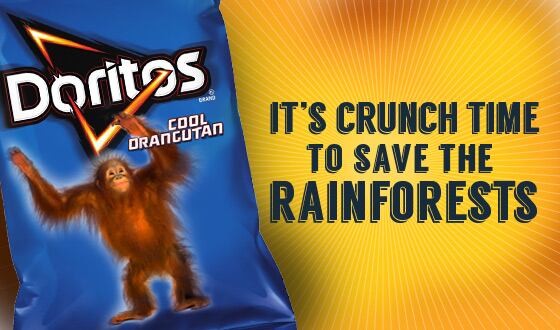Consumer activist group Sum Of Us launched a campaign against the Frito-Lay Doritos brand in December and recently published a spoof advert suggesting Doritos contained unsustainable palm oil sourced through deforestation.
The online ad ‘Love at first bite – The ad Doritos don’t want you to see’ contains the statement ‘Doritos – may contain traces of rainforest’ and has been made public to coincide with PepsiCo’s annual Doritos Super Bowl campaign.
However, PepsiCo has refuted the campaign. A spokesperson told this site: “It is no surprise that Sum Of Us’ continual mischaracterizations of our palm oil commitments are patently false and run counter to the positive reception our policies have received from expert organizations in this arena.
“…This latest public relations stunt, focused on fiction rather than facts, does nothing to foster positive dialogue or affect positive change. We find our policies effective and stand by them.”
Sum of Us seeks palm oil policy change
Hanna Thomas, senior campaigner at Sum Of Us, said the organization's campaign against Doritos was part of a long-running effort with Rainforest Action Network (RAN) to push PepsiCo to change its current palm oil policy.
“We hope that PepsiCo will take a look over their policies and the current gaps, and make the decision to be a leader in their industry. It’s no good to just do the bare minimum. PepsiCo is such a large company with such a huge amount of purchasing power, they should be out in front and taking the impacts of the snack food industry seriously,” she told BakeryandSnacks.com.
She said the push against PepsiCo was based on RAN’s ‘Snack Food 20’ report, published in 2013, which suggested the company, along with 19 other snack firms, had inadequate palm oil policies.
PepsioCo's palm oil policy
However, PepsiCo fought back, stating the company had repeatedly said it was committed to using 100% Roundtable for Sustainable Palm Oil (RSPO) certified palm oil by 2015 and ensuring zero deforestation in its activities and sourcing.
In May last year, PepsiCo said it would tighten palm oil supply controls further by 2016 to ensure all suppliers were RSPO members and complied with PepsiCo’s Forestry Stewardship Policy which focused on stopping further development on High Carbon Stock (HCS) and High Conservation Value (HCV) forests.
It said it was committed to realizing zero deforestation in company-owned and –operated activities throughout its supply chain by 2020.

More needs to happen…
However, in a letter addressed to PepsiCo CEO and chairman Indra Nooyi two months after the pledge, Sum Of Us said the company had to stop further development in High Conservation Areas (HCA), not just forests, and also implement independent verification audits on suppliers, rather than just relying on RSPO certification and membership.
Sum Of Us’ Thomas said PepsiCo had made some improvements since, but suggested these weren’t enough and it should follow in the footsteps of Kellogg, Dunkin’ Donuts and Krispy Kreme which had taken the lead in the past year. Kellogg revamped its palm oil policy in February, 2014, following months of protests from a host of environmental agencies and consumer networks, including Sum Of Us. General Mills also revamped its palm oil policy to explicitly include efforts against deforestation in March, 2014.

“PepsiCo purchases 427,500 tons of palm oil a year, so yes, we believe that they could have a massive impact on the industry if they improved their palm oil policy.”
Asked why Sum Of Us had focused in on just one of Frito-Lay’s snack brands, she said: “We find that focusing on brands that have resonance with our members, increases the chance of the campaign getting exposure and being effective. Consumers may not know or understand how PepsiCo operates, or a palm oil trader or supplier, but chances are they’re very familiar with Doritos.”
